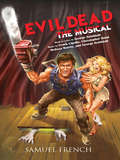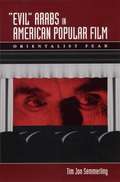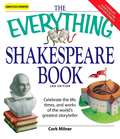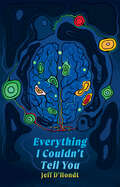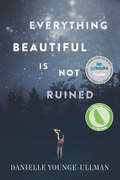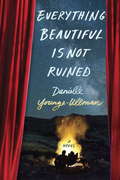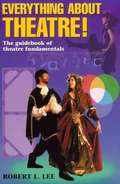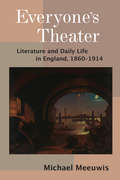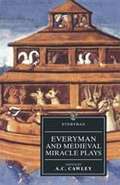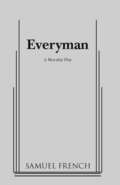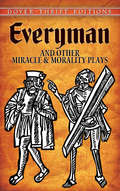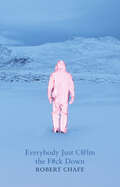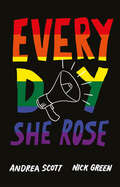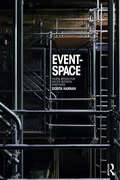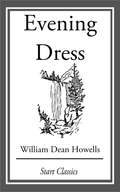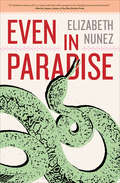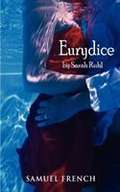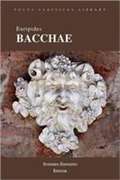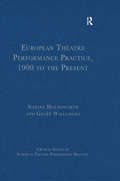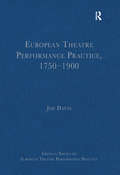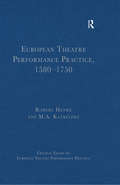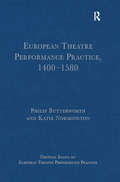- Table View
- List View
Evil Dead: The Musical
by George Reinblatt Frank Cipolla Christopher BondMusical Comedy / 6m, 4f / Unit set / Based on Sam Raimi's 80s cult classic films, EVIL DEAD tells the tale of 5 college kids who travel to a cabin in the woods and accidentally unleash an evil force. And although it may sound like a horror, it's not! The songs are hilariously campy and the show is bursting with more farce than a Monty Python skit. EVIL DEAD: THE MUSICAL unearths the old familiar story: boy and friends take a weekend getaway at abandoned cabin, boy expects to get lucky, boy unleashes ancient evil spirit, friends turn into Candarian Demons, boy fights until dawn to survive. As musical mayhem descends upon this sleepover in the woods, "camp" takes on a whole new meaning with uproarious numbers like "All the Men in my Life Keep Getting Killed by Candarian Demons," "Look Who's Evil Now" and "Do the Necronomicon." / Outer Critics Circle nomination for Outstanding New Off-Broadway Musical
"Evil" Arabs in American Popular Film: Orientalist Fear
by Tim Jon SemmerlingLooking at their narrative structures and visual tropes, he analyzes how the films portray Arabs as threatening to subvert American "truths" and mythic tales—and how the insecurity this engenders causes Americans to project evil character and intentions on Arab peoples, landscapes, and cultures. Semmerling also demonstrates how the "evil" Arab narrative has even crept into the documentary coverage of 9/11. Overall, Semmerling's probing analysis of America's Orientalist fears exposes how the "evil" Arab of American popular film is actually an illusion that reveals more about Americans than Arabs.
The Everything Shakespeare Book
by Cork MilnerWithout question, William Shakespeare is the most celebrated and quoted writer of all time. Whether you're a long-time fan or new to his writing, The Everything Shakespeare Book, 2nd Edition will help you fully appreciate and understand Shakespeare's works. In everyday language, this book covers everything from All's Well that Ends Well to The Winter's Tale-and every play and sonnet in between, featuring:Famous quotationsBackground information on Shakespeare's life and timesAn in-depth look at the controversy over the authorship of the worksAn Elizabethan English lessonWhether you're doing research for a school paper or simply building your literary knowledge, this book is the perfect introduction to the world and works of "The Bard of Avon."Cork Millner is a Shakespeare scholar, playwright, and author of several books, including To Be or Not To Be Shakespeare. He teaches writing at the University of California and Santa Barbara City College and has been on the literary staff for the prestigious Santa Barbara Writer's Conference for 20 years. He lives in Carpinteria, CA.
The Everything Shakespeare Book (The Everything®)
by Cork MilnerWithout question, William Shakespeare is the most celebrated and quoted writer of all time. Whether you're a long-time fan or new to his writing, The Everything Shakespeare Book, 2nd Edition will help you fully appreciate and understand Shakespeare's works. In everyday language, this book covers everything from All's Well that Ends Well to The Winter's Tale-and every play and sonnet in between, featuring:Famous quotationsBackground information on Shakespeare's life and timesAn in-depth look at the controversy over the authorship of the worksAn Elizabethan English lessonWhether you're doing research for a school paper or simply building your literary knowledge, this book is the perfect introduction to the world and works of "The Bard of Avon."Cork Millner is a Shakespeare scholar, playwright, and author of several books, including To Be or Not To Be Shakespeare. He teaches writing at the University of California and Santa Barbara City College and has been on the literary staff for the prestigious Santa Barbara Writer's Conference for 20 years. He lives in Carpinteria, CA.
Everything I Couldn't Tell You
by Jeff D'HondtRevived from a coma after a traumatic event, Megan’s injuries leave her capable of great violence, forcing her desperate physician Cassandra to recruit Alison, an Indigenous clinician, as her consultant. Alison uses an innovative form of technologically enhanced expressive arts therapy to augment the rehabilitative effects of speaking Lenape, their shared (and almost extinct) language. However, this reminder of cultural expression and identity triggers Megan, putting herself into a life-threatening situation. With Megan’s safety in jeopardy, Alison must internalize a life-changing lesson to save her: pain is often unjust, but it also reminds us that we’re alive.Everything I Couldn’t Tell You is a potent reminder of the healing and rehabilitative power within Indigenous languages.
Everything Beautiful Is Not Ruined
by Danielle Younge-UllmanThen Ingrid traveled all over Europe with her opera star mother, Margot-Sophia. Life was beautiful and bright, and every day soared with music. Now Ingrid is on a summertime wilderness survival trek for at-risk teens: addicts, runaways, and her. She’s fighting to survive crushing humiliations, physical challenges that push her to her limits, and mind games that threaten to break her. Then When the curtain fell on Margot-Sophia’s singing career, they buried the past and settled into a small, painfully normal life. But Ingrid longed to let the music soar again. She wanted it so much that, for a while, nothing else mattered. Now Ingrid is never going to make it through this summer if she can’t figure out why she’s here, what happened to Margot-Sophia, and why the music really stopped.From the Hardcover edition.
Everything Beautiful Is Not Ruined
by Danielle Younge-UllmanIn the tradition of Sara Zarr and A. S. King, a girl must survive an extreme wilderness experience to prove to her mother that she has the strength to pursue her dreams.Then: Ingrid traveled all over Europe with her opera star mother, Margot-Sophia. Life was beautiful and bright, and every day soared with music.Now: Ingrid is on a summertime wilderness survival trek for at-risk teens—addicts, runaways, and her. She’s fighting to survive crushing humiliations, physical challenges that push her to her limits, and mind games that threaten to break her.Then: When the curtain fell on Margot-Sophia’s singing career, they buried the past and settled into a small, painfully normal life. But Ingrid longed to let the music soar again. She wanted it so much that, for a while, nothing else mattered.Now: Ingrid is never going to make it through this summer if she can’t figure out why she’s here, what happened to Margot-Sophia, and why the music really stopped.
Everything About Theatre!: The Guidebook Of Theatre Fundamentals
by Robert L. Lee Theodore O. ZapelAn overview of all aspects of theatre The history, the crafts and the art of the stage are presented in eighteen units.
Everyone’s Theater: Literature and Daily Life in England, 1860–1914
by Michael MeeuwisNearly all residents of England and its colonies between 1860 and 1914 were active theatergoers, and many participated in the amateur theatricals that defined late Victorian life. The Victorian theater was not an abstract figuration of the world as a stage, but a media system enmeshed in mass lived experience that fulfilled in actuality the concept of a theatergoing nation. Everyone’s Theater turns to local history, the words of everyday Victorians found in their diaries and production records, to recover this lost chapter of theater history in which amateur drama domesticates the stage. Professional actors and playwrights struggled to make their productions compatible with ideas and techniques that could be safely reproduced in the home—and in amateur performances from Canada to India. This became the first true English national theater: a society whose myriad classes found common ground in theatrical display. Everyone’s Theater provides new ways to extend Victorian literature into the dimension of voice, sound, and embodiment, and to appreciate the pleasures of Victorian theatricality.
Everyman and Medieval Miracle Plays
by A. C. CawleyThis volume contains the moral play Everyman and a representative collection of medieval biblical pageants. The pageants have been chosen for their intrinsic merit and because together they give a fair idea of the range and content of an English Corpus Christi cycle. They are taken from the cycles of York, Chester, Wakefield, Coventry, and 'N. town', with the addition of an excerpt from the Cornish plays (Appendix I). Most of the original words of the plays are preserved, but for the convenience of the general reader many archaic forms and spellings are modernized or normalized both within the line and in rhyme. Occasionally, however, an archaic form is kept for the sake of the rhyme, and a gloss added if necessary. Original stage directions are given and those in Latin are translated; they are distinguished from editorial directions, which are bracketed. Difficult words and short phrases are glossed in the margin, while longer word-groups needing explanation are paraphrased in footnotes.
Everyman
by AnonymousThe old English morality play, without intermission. Anonymous. 11 m., 6 f., but these may be taken by all male or female cast. The most beautiful of all the old English religious plays. Especially recommended to churches and schools.
Everyman
by AnonymousWestern drama, having all but disappeared during the Dark Ages, reemerged spontaneously in the liturgy and life of the medieval church. Vernacular miracle plays of England's Middle Ages were performed by lay people -- many by trade guilds -- unschooled in church Latin, but familiar with the biblical events upon which the dramas were based. Morality plays provided moral instruction, their principal characters vivid personifications of virtue and vice. The most durable of the morality plays has proven to be Everyman, whose central character, summoned by Death, must face final judgment on the strength of his good deeds. This venerable drama is reprinted here along with three other medieval classics: The Second Shepherds' Play, Noah's Flood, and Hickscorner.
Everyday Voice Care: The Lifestyle Guide For Singers And Talkers
by Joanna CazdenThe human voice expresses more than words, more than music. Vocal expression links the listener directly to another person's inner feelings, body, and soul. Keeping the voice healthy used to be as mysterious as the power of voice itself. Modern science has revealed much about the vocal mechanism and its health requirements, but simple information for the average voice user has remained hard to find and harder to trust. In Everyday Voice Care: The Lifestyle Guide for Singers and Talkers , respected voice therapist Joanna Cazden brings together a wealth of practical tips and advice to help keep your own expressive voice in top working order. Drawing from her experience as a singer, theater artist, and a licensed speech pathologist who has treated more than 1,000 voice patients, Cazden integrates up-to-date medical information with common-sense suggestions and sympathy for the demands of contemporary life. Chapters on food and drink, cold remedies, loud parties, travel, fitness routines, and when to see a doctor are complemented by notes on alternative health care and the spiritual dimension of vocal rest. This invaluable resource for voice and speech professionals, students, and teachers will answer even the age-old question of whether to put lemon or honey in your tea.
Everybody Just C@lm the F#ck Down
by Robert ChafeAfter an unexpected night in a Regina hospital emergency room, Robert Chafe can’t shake the burning question of whether he’s Tennessee Williams or Dorothy Zbornak. Are his symptoms a harbinger of a terrifying undiagnosed condition, or is it all just in his head? Frenetic, tender, and sometimes scary, Everybody Just C@lm the F#ck Down is a stumbling folly about the aging body, mid-life anxiety, and what it means to live when you can’t know what’s next.
Every Day She Rose
by Nick Green Andrea ScottAfter the Black Lives Matter protest at the 2016 Toronto Pride Parade, two friends find their racial and queer politics aren’t as aligned as they thought, and the playwrights behind them must figure out how to write about the fallout. Cathy Ann, a straight Black woman, and her roommate Mark, a gay white man, came home from the parade with such differing views of what happened and how it affected their own communities. Cathy Ann agrees with the protest that the police presence at the parade doesn’t make her feel safe, while Mark felt safer with them there, especially in the wake of the Pulse nightclub shooting in Orlando. Frustrated he can’t see the bigger issue, Cathy Ann questions if she can continue living with Mark. Simultaneously, playwrights Andrea and Nick—who share the same identities as their characters—pause throughout the show to figure out how to work together to tell the story of a significant turning point in a friendship. Through both sets of dialogue, Every Day She Rose is a powerful exploration of white supremacy, privilege, and patriarchy in supposed safe spaces.
Event-Space: Theatre Architecture and the Historical Avant-Garde
by Dorita HannahAs the symbolists, constructivists and surrealists of the historical avant-garde began to abandon traditional theatre spaces and embrace the more contingent locations of the theatrical and political ‘event’, the built environment of a performance became not only part of the event, but an event in and of itself. Event-Space radically re-evaluates the avant garde’s championing of nonrepresentational spaces, drawing on the specific fields of performance studies and architectural studies to establish a theory of ‘performative architecture’. ‘Event’ was of immense significance to modernism’s revolutionary agenda, resisting realism and naturalism – and, simultaneously, the monumentality of architecture itself. Event-Space analyzes a number of spatiotemporal models central to that revolution, both illuminating the history of avant-garde performance and inspiring contemporary approaches to performance space.
Evening Dress: Farce
by William Dean HowellsMrs. Edward Roberts: "Now, my dear, Amy and I will get there early, so as to make up for your coming a little late, but you must be there for the last half, at least. I would excuse you altogether if I could, for I know you must be dead tired, up all night, that way, on the train, but Mrs. Miller is one of those people who never can listen to reason, and she would take deadly offence if you missed her musicale, and wouldn't forgive us the longest day she lived. So you see?" Mrs. Roberts addresses herself to her husband in the library of their apartment in Hotel Bellingham, at Boston, as she stands before the fire pulling on a long glove and looking at him across his desk, where he has sunk into a weary heap in his swivel chair. "You are dreadfully used up, Edward, and I think it's cruel to make you go out; but what can I do? If it was anybody but Mrs. Miller I wouldn't think of having you go; I'm sure I never want to have her about, anyway. But that's just the kind of people that you're a perfect slave to! Now, dear, I've let the two girls go out, and you must remember that you're in the place alone with the children; but you needn't be troubled, because nobody will come after this hour till Willis does, and the girls will be back before that. Willis is to come and get you on his way to the Millers', and it's all been arranged for you, and you needn't think of a thing till Willis comes. You'll have to dress, of course; but you needn't begin that at once, and you can just sit here in your chair and rest." Mr. Roberts stretches his arms wildly abroad, and, throwing back his head, permits himself a yawn that eclipses his whole face. Mrs. Roberts lets both her arms fall at her side in token of extreme despair. "Edward! If you should go to sleep!"
Even in Paradise
by Elizabeth Nunez"An epic tale of family betrayal and manipulation couched in superbly engaging prose and peopled with deftly drawn characters. In a story structure as rhythmic as the ebb and flow of the water surrounding Trinidad and Barbados, this revisiting of the classic story of King Lear becomes a subtle, organic exploration of politics, class, race, and privilege. A dazzling, epic triumph. " --Kirkus Reviews, Starred review "[Narrator] Émile remarks on parallels to King Lear repeatedly, but there is much more to unpack here. The issue of racism is woven throughout, as are regional problems such as access to Barbados''s beaches and poverty in Jamaica''s Tivoli Gardens. This is also a celebration of the arts, culture, and natural beauty of the islands. Shakespeare''s work is a tragedy, but for Émile ''the future shimmers before [him] full of wondrous possibilities. '' Nunez treats her source material with a deft touch, making this story impressive in its own right. " --Publishers Weekly "Nunez''s textured and engaging novel explores familial discord, along with questions of kinship and self-identity. . . . With a nod to King Lear, Nunez crafts an introspective tale as her vividly drawn characters navigate complications of heritage, race, and loyalty. " --Booklist "In her latest novel, Even in Paradise, acclaimed author Elizabeth Nunez reimagines Shakespeare''s King Lear set in the Caribbean. She transforms the classic tragic tale of betrayal and manipulation within a family into a more political meditation on race, class, and privilege featuring a multiracial cast of characters. " --Hello Beautiful, #BlackWomenRead: 17 Books by Black Women You Need In Your Life This Spring "Another engaging novel by an accomplished author who retells the story of King Lear in a Caribbean landscape with racial tensions playing out alongside the classic narrative of greed and parent/child relations. . . . [The novel] is structured with interesting and layered plots, but what I like best is [Nunez''s] exquisite language detailing Caribbean landscapes and people. . . . I strongly recommend this book, especially to those who love Caribbean stories. " --Me, You, and Books "Even in Paradise is Caribbean drama as grand epic. Nunez, always a master of unexpected contrasts, does it here again. A story told on a huge scale that still manages to be achingly personal and intimate. " --Marlon James, author of A Brief History of Seven Killings "The Caribbean is so blessed to have Elizabeth Nunez writing from and for us! This novel is pan-Caribbean and multiracial, crossing the West Indies with Caribbean characters ethnically originating in Africa, Europe, and the Middle East. Even in Paradise adds another dimension to how we read Shakespeare''s King Lear while celebrating the cultural institutions in the region that have made writers like Nunez possible. " --Tiphanie Yanique, author of Land of Love and Drowning Peter Ducksworth, a Trinidadian widower of English ancestry, retires to Barbados, believing he will find an earthly paradise there. He decides to divide his land among his three daughters while he is alive, his intention not unlike that of King Lear, who hoped "That future strife/May be prevented now. " But Lear made the fatal mistake of confusing flattery with love, and so does Ducksworth. Feeling snubbed by his youngest daughter, Ducksworth decides that only after he dies will she receive her portion of the land. In the meantime, he gives his two older daughters their portions, ironically setting in motion the very strife he hoped to prevent. Beautifully written in elegant prose, this is a novel about greed, resentment, jealousy, betrayal, and romantic love in the postcolonial world of the Caribbean, giving us a diverse cast of characters of African, Indian, Chinese, Syrian/Lebanese, and English ancestry.
Eurydice
by Sarah RuhlDramatic Comedy / 5m, 2f / Unit Set In Eurydice, Sarah Ruhl reimagines the classic myth of Orpheus through the eyes of its heroine. Dying too young on her wedding day, Eurydice must journey to the underworld, where she reunites with her father and struggles to remember her lost love. With contemporary characters, ingenious plot twists, and breathtaking visual effects, the play is a fresh look at a timeless love story.
Europides' Bacchae
by Paul Woodruff Stephen EspositoAn English translation of Euripides' tragedy based on the mythological story of King Pentheus of Thebes and his fateful encounter with the god DIonysus. Includes an introductory essay, extensive notes, appendices on lacuna, a geneological chart of the gods, and an essay by Valerie M. Warrior: "The Roman Bid to Control Bacchic Worship". The Focus Classical Library provides close translations with notes and essays to provide access to understanding Greek culture and the roots of contemprary thought.
European Theatre Performance Practice, 1900 to the Present (Critical Essays on European Theatre Performance Practice)
by Geoff WillcocksThis volume captures the rich diversity of European performance practice evident in the twentieth and early part of the twenty-first century. Written by leading directors, actors, dancers, scenographers and academics from across Europe, the collection spans a broad range of subject areas including dance, theatre, live art, multimedia performance and street protest. The essays are divided into three sections on: performers and performing; staging performance; representation and reception, and document innovations in acting, performance and stagecraft by key practitioners. Articles also explore the ways that performance has been used to stage debates around major preoccupations of the age such as war, the human condition, globalization, the impact of new technologies and identity politics. This volume, which features previously published performance manifestoes, articles, and book chapters on the most frequently discussed and debated topics in the field, is an indispensable reference work for both academics and students.
European Theatre Performance Practice, 1750–1900 (Critical Essays on European Theatre Performance Practice)
by Jim DavisThis volume contains key articles and chapters which represent both seminal and innovative scholarship on European theatre performance practice from 1750 to 1900. The selected topics focus on acting and performance, staging (including set design and lighting), and audiences, and are approached with a broad perspective as well as with in-depth, focussed analysis. The volume captures the rich, dynamic and variegated nature of European theatre throughout the late-eighteenth and nineteenth centuries and provides a carefully selected body of significant texts on this important period of theatre history.
European Theatre Performance Practice, 1580-1750 (Critical Essays on European Theatre Performance Practice)
by Robert HenkeThis volume presents foundational and representative essays of the last half century on theatre performance practice during the period 1580 to 1750. The particular focus is on the nature of playing spaces, staging, acting and audience response in professional theatre and the selection of previously published research articles and book chapters includes significant works on topics such as Shakespearean staging, French and Spanish theatre audiences, the challenging aspects of the evolution of Italian renaissance acting practice, and the ’hidden’ dimensions of performance. The essays provide coherent transnational coverage as well as detailed treatments of their individual topics. Considerations of theatre practice in Italy, Spain and France, as well as England, place Shakespeare’s theatre in its European context to reveal surprising commonalities and salient differences in the performance practice of early modern Europe’s major professional theatres. This volume is an indispensable reference work for university libraries, lecturers, researchers and practitioners and offers a coherent overview of early modern comparative performance practice, and a deeper understanding of the field’s major topics and developments.
European Theatre Performance Practice, 1400-1580 (Critical Essays on European Theatre Performance Practice)
by Philip ButterworthThis volume brings together important records of medieval theatre practice between 1400 and 1580. The records are drawn from a wide range of spheres including civic, ecclesiastical, trade and guild records and consist of payments for materials, techniques and services; also included are some eye witness accounts. Alongside these records is a selection of the best contemporary research conducted into medieval performance practice, which features ground-breaking analysis and challenges current understanding, knowledge and authority in this field. These contributions of rigorous scholarship complement and support the work of the well-known Records of Early English Drama project and help to further illuminate contemporary fifteenth and early sixteenth-century theatre performance practice.
